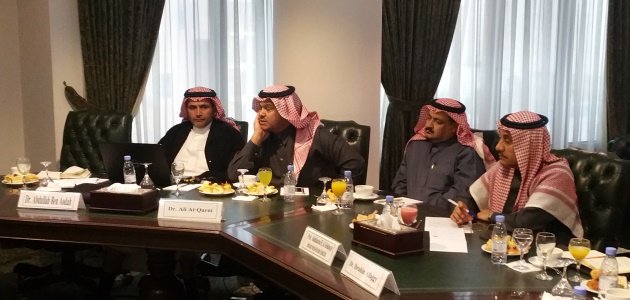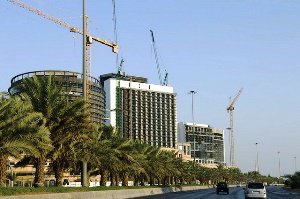A visit to Saudi Arabia completes the study tour of the Course for Senior Officials at the Federal Academy for Security Policy. Talks centred around the conflict in Yemen, the fight against terrorism and the social and political development of the Kingdom.

The visit to Riyadh included a number of stops. Pictured here: members of the Institute for Diplomatic Studies, which is part of the Foreign Ministry, participate in talks. Picture: Federal Academy for Security Policy
After visiting Iran, the Course for Senior Officials proceeded to visit the United Arab Emirates with stopovers in Dubai and Abu Dhabi. Both emirates fascinate the visitor with superlatives of all kinds: the world's tallest building, the largest traffic hubs, the most gigantic shopping malls. Also, it became evident that the post-petroleum era is given much thought there: What must be done to maintain the downright spectacular economic rise once the buoyant revenue from oil has dried up? The challenges arising in this context are social rather than solely economic in nature. The loss of much-loved privileges, higher taxes, the integration of elites into the labour market or the new role of women in society are changes that can only gradually be addressed and communicated.
From the United Arab Emirates, the course proceeded to the final leg of the tour in Saudi Arabia. In the Saudi capital of Riyadh, the team surrounding Michael Ohnmacht, the Deputy Head of Mission at the German Embassy, educated the course participants on the local political and economic environment. This was followed by a discussion with General Abdulilah Al-Saleh, Secretary General of the Islamic Military Coalition for Counter Terrorism. Additional visits to security policy institutions included the headquarters of the Gulf Cooperation Council, the Institute for Diplomatic Studies, the King Faisal Centre for Research and Islamic Studies and the training project of the German Federal Police in Saudi Arabia. Economic issues were discussed at the Representation of the European Union and with CEOs of German companies in Saudi Arabia. Dr Mohammad Alissa, General Secretary of the Muslim World League, answered questions on the role of religion.
The dominant impression is one of impending social and political change

Caught between tradition and modernity:
The dominant impression was that Saudi-Arabian reforms are also aiming at the gradual opening up of its ultra-conservative society. Picture: sören2013/flickr/CC BY-NC-SA 2.0
Concerning the situation in Saudi Arabia, the impression was one of impending political and social change. According to the assessment of several course participants, “Saudi Vision 2030”, the comprehensive reform project promoted by the political leaders, extends significantly beyond a strategy for the post-petroleum era and also envisions the gradual opening of the ultra-conservative society and sustainable changes in gender relations.
The conflict in Yemen was the main topic of discussion in terms of security policy. On the basis of a United Nations Security Council Resolution, the armed forces of Saudi Arabia are attempting to reinstate the legitimate government of the country. Saudi Arabia is frequently subject to international criticism regarding this matter. For instance, Saudi-led air attacks resulted in the accidental bombing of civilians – a development that had been provoked deliberately by Yemeni insurgents, who were firing from positions and installed arms depots inside hospitals and schools.
After the end of the study tour, the Course for Senior Officials will return to Berlin. At the Federal Academy the results of discussions and impressions from the region will be reflected upon together and an executive paper will be prepared. A discussion of the results with Peter Altmaier, Head of the Federal Chancellery, will conclude the Seminar.
Written by: Editorial Staff
